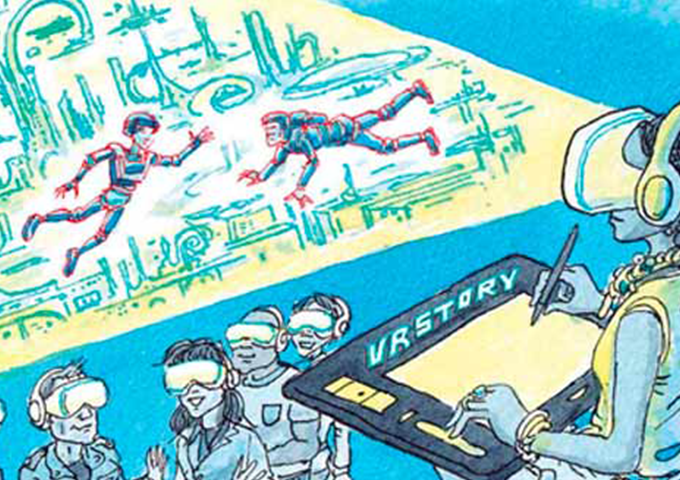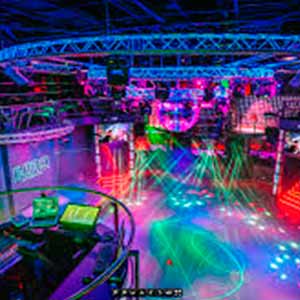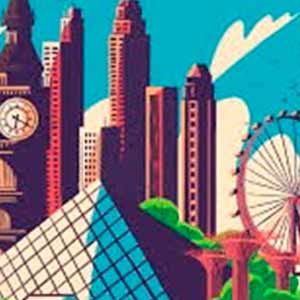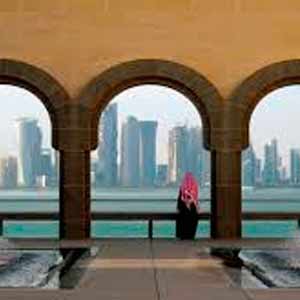Narration and Database: Analysis of the modern Society in the Information Era. Identity and Power dependence relations
Jose David Quiñones V
Jose David Quiñones V

Human life, the past, the present and the future, it is all about a story being told by a voice which is still not visible. The future might take us to a new fourth dimension, but it will be still the same story.
Narration and the construction of the world
The position that narrative occupies is very significant for human interaction and history. Although, the twenty-first century has seen a tremendous change on how humans understand the world, what mechanisms they use to define themselves and how they identify with culture. “Whereas in the classical Greek and Roman era narrative was accepted as an adequate explanation for large-scale events-the creation of the world, the dynamics of wind and fire, earth and water-global explanations are now typically rooted in data analysis”[i].
The history of the past has been told by myths, legends and magical events that had been inspiring people’s minds, and had led them create and recreate the world as they wish. Today the story has been transformed into data. Description of events that can be measured and proved by science. Never the less, it seems like science still needs the old narrative to continue and prove how the events respond to natural causes or forces that reign them.
In the late 18th and 19th century people used to seriously believe in myths, fairy tales, legends and magic. With the beginning of modern rational thought, the magical imagination started to be condemned and new principles were given to explain how things work here on earth. Naturally the irrational or imaginative way of thinking has always been part of people’s belief, even if they do not recognise it.
Nowadays it is possible to affirm that this knowledge exists in a different way. There are hundredths of stories about magicians, myths about the devil, witches and extraordinary people who can fly, like some disciples of Lao-Tse in China. Many movies are based in old haunted houses and magical spells. The general idea of magic is still in people’s mind which is the result of old experiments from those who tried to find a source of invisible power.
Indeed magic can be defined as a supernatural power of transforming things, or the knowledge of making things appear in one place or another. It is like a click you make to transfer your money from the bank in Hong Kong to Taipei. Very similar to the new modern technology; the digitalized world, the augmented reality and the virtual reality between other ways of reproduction which include photography and cinema, as its best medium of expression. It is the possibility that human beings have to create and realise that matter does not destruct itself but it changes. (Antoine Lavoisier) “The father of modern chemistry”.
For example, in Britain modern society is influenced by magic due to its culture. The folklore of the Celts has had an enormous nexus with modern society at the point that it is considered alive. This world is made of believes. Everyone, believe it or not, believes in something. Even when they say that they don’t believe in anything they believe in something: technology, science, democracy, God or evil.
As William Goodwin said, “If we would know men in all his subtleties, we must deviate into the world of miracles and sorcery. To know the things that are not, and cannot be, but have been imagined and believed” William Goodwin, Lives of the Necromancers (1834).
Furthermore, we can see how Nineteenth-century urban communities were essentially narrative communities. (Bell, 2012) The experience of every single one was influenced since that time and before, by the stories and narratives that people started to imagine and create from what they were seeing each day and from their old people who had a different view of how, civilization was starting to take place. It is naturally a matter of time and space that has been evolving in relation with human beings and their knowledge.
For instance, the appearance of light as an electric bulb was a step ahead in the fight with darkness. From that moment on, people will be able to see the deepest background of the night and start conquering new spaces that were unavailable before. They won’t be afraid of the dark anymore.
The stories of today are necessarily related with technology and even more with space and time. Journeys to the moon and other planets. Life beyond Earth and unknown beings who want to conquer the Earth. That’s the reason why the modern society and new ways of communication have a lot to do with old narrations of the future and how to gain power, which can be conceived as a particular way of knowledge.
Nowadays we are still creating and re-creating the space despite the disenchantment of the world that Max Weber predicted. There are still many people writing, painting, imagining and creating. Many people making films and new ways of expression. There is still enough people reading and learning about where they come from and where they want to go, which is in itself a way of narration.
Whatever you can imagine today is possible. The modern European society is now connected with the past and future by their culture, as they are by the smartphones and the train rails system that transports them. Today’s modern world is naturally associated with technology, speed, and virtual bank account movements. Everything is as magical as a click. This is the closest connection with the future. This is an influence that everyone is getting and it is also an experience that everyone can share. The database actually serves people to create their stories and to narrate their lives with more information of the current changes of our planet.

Power dependence Relations
What is power? Where is it? Who has it and how does it work? It seems that power rests on the powerful and that the powerful exercise power over the less powerful who are subjects of the wishes of the powerful. Although, from a sociological approach, “Power is not an attribute of the actor, it is a property of social relations”[1]. This means that power is the result of a way of interaction.
To explain it in an easier way, “The power of A over B is equal to and based upon, the dependence of B upon A”[2]. Having this, we can imagine that there are balanced and unbalanced relations according to the wishes, needs, passions, emotions, inclinations, dispositions and interests of the actors and that basically all the irrational feelings of individuals should be somehow ruled or directed by logic and reason, which responds to database because it is given that this is what can really make a better life, and therefore what humanity is searching for.
Nowadays human kind is searching for something that exceeds the limits of chaos and order. Something that can replace moral sentiments and ethic behaviours. The future seems to be made up of calculation and efficiency. There is no more time and space for emotions. Rules and norms must prevail in the name of results and it is well known that we are living in the world of database where everyone depends on the information, and therefore the one who controls the information is the one who has the knowledge.
According to Zigmunt Bauman, “an orderly world is one in which probabilities of events are not random”[3] and furthermore he states that moral is a system of laws, rules and norms that clearly specify what individuals should do and what they should not do in a given situation to preserve the code of live given in a society. So, to him “teaching or coercing people to be moral means making them obey that ethical code” which is not given by myths a legend or narration but data.
By this reasoning, becoming moral’ is equivalent to learning, memorising and following the rules”[4] and to reach this purpose and assure the prevalence of morality through following rules modern society is allowing database to define what is good or wrong according to the patterns that have been proven by scientific methods which are more effective.
The common factor between narration and database is the very controversial meaning of reality. Basically, in today’s modern world, narration needs the information provided by data to be told, and there is no useful database without the possibility of being transformed into something that gives sense to human’s life which is narration.
This is a power-dependence relation given in which one actor depends on the other to obtain what is searching for and the other actor might be willing to achieve the same goal, or at least get a benefit from it. This is the way in which power-dependence relations work between narration and database in the complex system that has been created by the interaction and integration of human’s experiences, measured by science in the path to achieve a technocratic civilized world ruled by efficiency and represented on data and database.
Identity and the Modern European Society

Identity is naturally what better describes a person in the horizon of ideas. It is its own way to say this is me and this is how I am. It is what connects a human being with its culture and also a way of living, which goes according to what better defines himself in society. When a nation is engaged in cultural exchanges with the world, identity is given by what people do and represent in the world. It is the way of culture to express itself through people and it is a way of understanding the role in society and how its own culture is related with the world.
Nowadays the complete connection of the world through a social and economic system has been shaping the way in which society is working and how individuals define themselves at the personal and social level. In fact, “new media technologies are making it possible to transcend the distances that have separated ‘diasporic communities’ around the world from their ‘communities of origin”[5]
The modern society as a global civil society is a historical consequence followed by the need of individuals to gather together for different but common interests that help their lives go easy and develop towards the path of working and enjoying. Live is made up to enjoy, but to get the most of it you have to be productive and to be productive you have to follow certain rules of society that tell you how is the best way to achieve the common goods.
Modernity and all its new media technology is helping connecting people and also shaping their identity in a broaden way in which individuals with access to information, radio, TV, newspapers, magazines and Internet start shaping their realities according to what they hear or see in a way that gets to be standardised and somehow global. According to Robins and Aksoy, “the national mentality may be disrupted, creating a space for new transnational perspectives to emerge”[6]
The migratory fluxes from all over the world to western European countries is a large process that has being shaping many aspects of both European and migrant’s identity and society. The most relevant aspect of this process is that the migrants are taking as much as they can from the abroad culture to apprehend and appropriate the new values and principles so they can become European citizens and participate in social life as such.
To be European, means in many ways to be modern: To think and act in a rational way so that the individual goals can be achieved according to the society standards and norms. According to this spectrum, the migrants coming from Africa, America and Asia, are trying to achieve the knowledge that they need in order to become modern and therefore to obtain their individual goals according to the western European model.
This western European model is based on a capitalist way of being and its way of creating identities is influenced by the practices that support the capitalist way of production and therefore, religion and sexuality have a totally different role as it had on the past, the same as all the aspects related with leisure, gastronomy, recreation and hygiene, between others.
The elements that help develop such identity are common related with the way of production and consumption that has been implemented by the western European society and off course to the cultural practices that define the common culture and identity of Europeans, which is still in its process of integration, and in some cases disintegration and reintegration like in the latest case of the UK, Spain and the continues negotiation of Turkey.
The social and cultural identity in our days is the result of an interconnected system of working and producing based on technology. Thanks to the development of science and technology, human beings are able to produce in a massive way that allows them to have a great capacity of consumption and also to travel around the world obtaining a great experience of modernity that is constantly shaping their identity as a common modern identity that reflects the modern patterns of self being towards the future.
As the world keeps moving and humanity within too, “The poets may go on composing their national songs, the nations may go on singing them on their respective independence days, people may go on demanding that their "national in form, European in content"[7] all the narrative will keep going and the migrants will feel much more part of Europe as much as they understand and learn about the common links that unite every society into one whole society that make individuals become nationals and therefore citizens of the world.
The migrants have achieved many single manners of the European way of being. Now it is easy to see Arabs wearing ties in London, Asians singing love songs in Berlin, Africans dancing Tango in Paris and Americans cooking Italian food. The new tendencies of modernity are all taken by different types of communities in many ways that even the nationals of Europe would not ever imagine. The migrant’s identity is getting to be part of the whole modern society as a conduct that alouds freedom of expression at its best.
Regarding the working aspect, migrants are getting to be more productive. They are learning to follow the rules of the game and participating more actively in society. Although there are many cases of unfortunate migrants in Europe, the ones who have a job care for it, the ones who study are more engaged with the academy and the ones who have already received any European Nationality try to participate in a democratic way in the decisions taken in political and economic aspects. They are getting to be part of Europe as citizens, which means that they are recognised as equals and therefore share a common identity.

Conclusions
Given that in today’s modern world influenced by globalization and all the facilities that bring the new technology and cultural exchange, more and more people are now living their lives in two worlds at the same time. They usually belong to two or more societies and have a plural identity that has been defined by both national and transnational experience that make them citizens of the world.
The 21st century has emerged from a deep exchange of practices all along Europe, America, Asia and Africa and the result of this mixture is the new societies that are commonly engaged by the roots of languages, common history, social and cultural practices that have evolved into a new open society and a capitalist system.
The new migrant’s identity is a melange of stories, poems, songs, and experiences from their own past with the modern life that comes from outside calling them for new experiences and ideas of the future. Life still seems to be ruled by narration, even when the technologic system of data tries to prevail. They are constantly between the past and the future trying to build their own individuality by taking from here and there and by learning from others like them and from those who are not like them. The migrant is always an open world to uncertainty trying to find a certain way of living that combines their need for security and their wish for freedom.
[1] See Hayles, Katherine, 2012, p. 181
[2] Ibid
[3] See: Bauman Zigmunt, “Alone Again:Ethics after certainty”, p. 4
[4] Ibid
[5] Kevin Robins & Asu Aksoy, “New complexities of transnational media cultures”, p.44
[6] Ibid
[7] Ibid